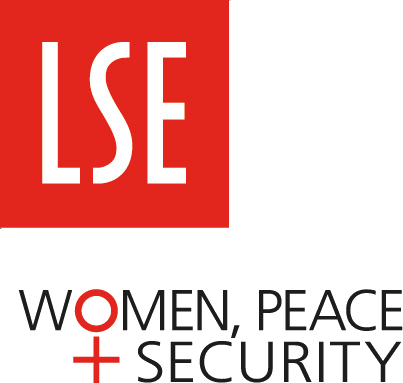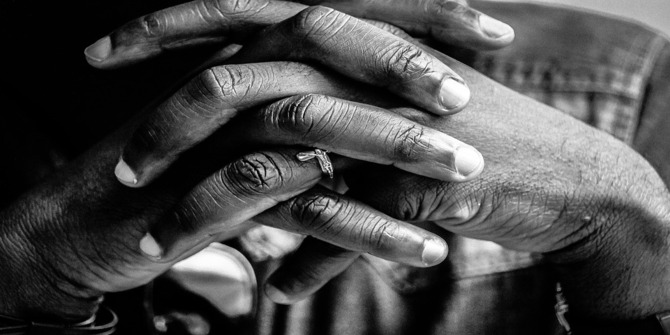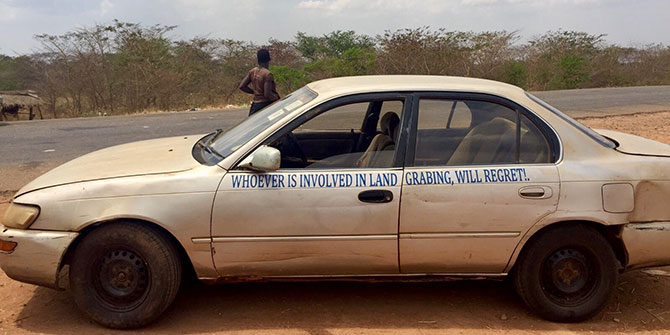Gino Vlavonou explores how multiple public authorities shape the current armed conflict in CAR.
This article is part of the #PublicAuthority blog series, part of the ESRC-funded Centre for Public Authority and International Development.
Armed conflicts are complex and the Central African Republic (CAR) is a place where the national government and international community have been struggling to bring about peace. Armed groups are active, still hold considerable amount of the sovereign territory, and the UN mission (MINUSCA) continues to witness attacks against peacekeepers, aid workers and civilians throughout the country. This reality stands in stark contrast to the assessment of the General Commander of MINUSCA in which he noted an improving security situation.
The arrival of Russian military advisors in CAR sparked debate and fear that they would only contribute to making things worse. If anything, the arrival of Russian advisors and trainers proves that CAR continues to be relevant only through the lens of big power politics (France, the USA, China and now Russia). This is why CAR is historically understood as the ‘periphery of the peripheries’.[i] In that sense, the arrival of the Russian military advisors should be considered as part of a more entrenched dynamic between external powers and CAR whereby the latter was founded and developed on concessionary politics. From customs to security, CAR is accustomed to outsourcing several of the government’s duties. As Smith argues, ‘the greater the local needs, the more numerous the opportunities to carve out ‘concessions’ and to allot them to outsiders in return for […] particular services.’[ii]
In line with this argument, the Russian presence could distract from more pressing issues such as corruption, exclusion, poverty and justice. Employees of the Ministry of Transport recently raised concerns over allegations of corruption by the Minister, but the government to date has not taken any strong steps toward investigating these allegations. Other commentators present rebels as moved by greed and rent-seeking behaviour. At the same time, the fact that the UN Security Council authorised Russia to deliver weapons to CAR and train their soldiers has also influenced the government’s calculations that maybe a peace deal is not necessary, and a military win is possible. The CAR government’s sustained lobbying for redeploying the armed forces suggests that a military confrontation with ex-Séléka rebels is a possible outcome.
This is not to deny the ongoing internal and external changes about the conflict in the CAR, but rather to illustrate the need to understand how multiple public authorities shape the current armed conflict in CAR. From the international to the local, multiple actors are linked in complex ways. Public authority, as the Centre for Public Authority and International Development (CPAID) and the Understanding Violent Conflict program at the Social Science Research Council (SSRC) argue, refers to any institution outside the immediate family that is capable of eliciting consent and has a role in conflict management. However, as Hoffman and Kirk suggest, we know little about how many public authorities actually function in these sorts of conflict-affected regions. Here, by taking a closer look at one public authority (the Interfaith Religious Platform[iii]), I suggest that the answer lies in understanding how public authorities are socially embedded. How does a public authority like the Interfaith Religious Platform claim legitimacy and carve out a legitimate space for itself in managing conflict and providing these public services? How do authorities compete for such legitimacy?
This Platform has taken a firm stand in managing conflict and violence in the CAR. It is comprised of the three most prominent religious leaders in CAR who have been calling for peace and social cohesion between their followers nationally and internationally. They have sought to move attention away from religious motives for violence, highlighting that religious differences did not cause the conflict. That has been their key message since the armed conflict began, although the platform was only officially created in 2016. The Platform is composed of Imam Kobine Layama (head of the Central African Islamic Community – CICA), Cardinal Dieudonné Nzapalainga who represents Catholics and Pastor Nicolas Guerekoyame-Gbangou (head of the Evangelical Alliance).

The Platform was among the early actors to disseminate the non-religiosity of the conflict through various media outlets and, particularly to the international community. They claim success for spreading their message to a diverse audience. On 30 September 2018, members of the platform, the Cardinal and Imam Oumar Kobine Layama, in the presence of the prime minister of CAR, Simplice Mathieu Sarandji, delivered a speech calling for reconciliation. As a result of their activity, these religious leaders have been recognised internationally (2014, 2015, 2016). But it is difficult to be certain just how influential the platform actually is.
However, while conducting research in the CAR between May and October 2017, I discovered that this international recognition does not seem to have translated into legitimacy at the local level. Some of my interviewees agreed with the overall message of the platform – that Christians and Muslims have long been living peacefully together in CAR – but did not believe in the credibility of the religious leaders and were suspicious of their actions.
While the calls made by religious leaders for peace and reconciliation are invaluable, the context in which they were made matters. Understanding the local embeddedness of public actors in CAR means considering how ethnicity and religion might complicate how these authorities elicit consent and practice power. In this case, all three key leading members of the platform belong to the same ethnic group: the Yakoma, a minority in CAR.[iv] The Yakoma are associated with former President André Kolingba (1981-1993) who has been credited with instrumentalising ethnicity and promoting Yakoma to powerful positions in the government and army, which ultimately provoked army mutinies in 1996-1997.
Public authority contains an element of recognition by those at whom authority is directed and in the case of the Interfaith Religious Platform; politics, ethnicity, and religion are part of understanding the work of public authority. The way authority is exercised in transitioning conflict countries must be attuned to the social embeddedness of the actors. Therefore, the prominence of Yakomas on the Platform is viewed with suspicion. As some interviewees expressed, the Yakoma want to take back power. However, various political leaders from Emperor Bokassa 1st to Catherine Samba-Panza have used ethnicity as a political tool to govern and access power. For one armed group leader, this religious grouping simply works for its own interests and is far from representing all of the religions in CAR. Claiming authority and a space in managing conflict has been a struggle for the members of the platform.
There has been a similar struggle to exercise authority in the main Muslim neighbourhood of PK-5 in Bangui. Imam Kobine lost credibility in that neighbourhood. At the height of the conflict, he took a firm stand against the violent Muslim actors in PK-5. As a result, he was disavowed by many community leaders. Imam Kobine’s Bangui residence is not in PK-5, but a mainly Christian neighbourhood. When the violence was at its worst, it was the Cardinal that protected him from attack – a fact which demonstrated his disconnect with the Muslim community. The PK-5 residents to whom I spoke complained that while Imam Kobine was receiving acclaim for his messages of peace around the country, they did not believe that he was accountable to them, or that he represented their interests.
Of course, the Muslim community in PK-5 is not monolithic, but many felt that the arrival of Seleka would contribute to the end of long-standing discrimination against them. Muslims felt discriminated in terms of access to state jobs and other opportunities. In addition, Muslim traders were victims of regular harassment by security officers who generally demanded large bribes at roadblocks. Therefore, hearing the Imam speak against the Seleka gave the impression that he did not understand the grievances of the community.
Additionally, there have been a number of concerns about Pastor Guerekoyame-Gbangou doing business with the church and question marks about his honesty. Many believe the third member, Cardinal Nzapalainga has taken advantage of the crisis to be promoted from archbishop to Cardinal. There was also criticism of him being out of touch with the common people – this was from pastors to whom I spoke in the rural area of Yaloké (Ombella-M’Poko prefecture). Other pastors in the capital city blame the platform for the refusal of the international community to rearm the Forces Armées Centrafricaines (FACA). These criticisms diminish the efficacy of the Platform’s message locally. However, the Interfaith Religious Platform continues to be vocal in calling for peace, and did so recently in December 2018 after a rebel group attacked a camp of displaced people sheltered in a Catholic Church compound. All members of the Platform delivered messages of condemnation on their official website.
From this example, the social embeddedness of a public authority determines how it manages conflict. In line with this, one should also consider how bilateral partners and international actors claim legitimacy in managing conflict. The Platform cannot be certain of the local reception of its message of peace, even if it is effective internationally in changing perceptions and receiving admiration. As none of the religions represented on the platform is internally monolithic, the leaders of each faith have not yet succeeded in silencing the more violent segments of their followers. This is a challenge when it comes to understanding conflict and violence and even more so when considering the usefulness of the public authority framework in conflict and violent situations.
Read more about #PublicAuthority and visit our website.
Gino Vlavonou (@GinoVlavonou) is a PhD Student at the School of Political Studies at the University of Ottawa.
The views expressed in this post are those of the author and in no way reflect those of the Africa at LSE blog, the Firoz Lalji Centre for Africa or the London School of Economics and Political Science.
[i] Denis Cordell, Dar al-Kuti and the Last Years of the Trans-Saharan Slave Trade, The University of Wisconsin Press: Wisconsin, pg. 51. See also Roland Marchal “CAR and the regional (dis)order” in in Making Sense of the Central African Republic, edited by Tatiana Carayannis and Louisa Lombard, Zed Books: London, pg. 167.
[ii] Stephen Smith “The Elite’s Road to Riches in a Poor Country” in Making Sense of the Central African Republic, edited by Tatiana Carayannis and Louisa Lombard, Zed Books: London, pg. 115.
[iii] Plate-forme des confessions religieuses de Centrafrique (PCRC).
[iv] The Yakoma is an ethnic group part of the larger Ngbandi ethnic group. According to the 2003 census of CAR population, the Ngbandi ethnic group represented 5.5% of the country’s population.





